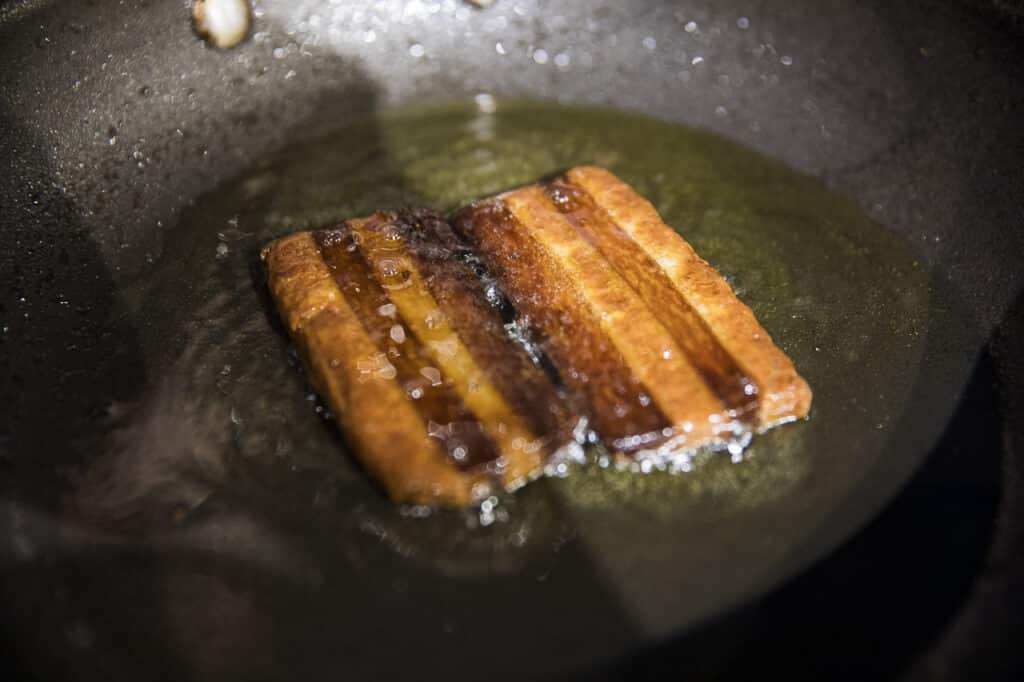In May, 2023 the San Francisco-based startup Lypid introduced a game-changing vegan fat called PhytoFat, offering a significant step forward in the development of plant-based meats. From a carbon reduction and sustainability standpoint, this innovation could help make plant-based alternatives more appealing and reduce reliance on animal products, which have a high carbon footprint per calorie.

Makers of plant-based meats have long sought to mimic the juiciness, flavor, and texture of animal fats. Prior solutions, such as the use of coconut oil in Beyond Burgers, have met challenges due to differences in melting temperatures compared to animal fats. Coconut oil melts at just 78 degrees F, while pork fat renders at around 130 to 140 degrees F, leading to less satisfying cooking results.
Unusual recipes have cropped up on the internet to get around the problem of making food from “healthy” ingredients but mimic the flavor of the “unhealthy” foods. Banana peel bacon, an unusual concoction made from frying banana peels, is a case in point.
PhytoFat, developed by Lypid’s cofounders Michelle Lee and Jen-Yu Huang, is made from plant-based oils, water, and flavorings designed to mimic beef or pork. What sets it apart is its high melting point, achieved through a process called microencapsulation, wherein tiny droplets of oils are encased in a coating to create capsules that behave like animal fats.

In addition to being suitable for high-temperature cooking, Lypid’s fats are lower in saturated fats than animal-based ones, offering a healthier alternative.
To demonstrate the potential of PhytoFat, Lypid has created its own plant-based pork belly. Yet the primary business model is providing PhytoFat as an ingredient for other food companies. Offering three types, each with different melting points and textures, it has already been used in plant-based burgers and bao buns – also known as steamed buns which consist of a dough wrapping with a meat-based interior.
The company first launched in Asia, securing a deal with Louisa Coffee, Taiwan’s largest coffee chain, to serve plant-based burgers using PhytoFat in over 500 stores. Now, Lypid is expanding its footprint in the U.S., catering to restaurants and food companies.

This innovation can drive creativity in plant-based cuisine, as PhytoFat can withstand a variety of cooking methods, including pan frying, oven baking, and braising. As such, it has the potential to make plant-based diets more appealing and accessible, helping to reduce the environmental impact of our food systems.
Plant-based meat substitutes have been a focus of research and development for several years now, given the environmental, health, and ethical considerations associated with traditional animal farming. These alternatives aim to replicate the taste, texture, and nutritional value of meat, using plant-derived ingredients.
Some of the most notable companies in this field include Beyond Meat and Impossible Foods. Beyond Meat’s products are made from a mix of pea, mung bean, and rice proteins, while Impossible Foods’ key ingredient is soy leghemoglobin, a protein that carries heme, an iron-containing molecule that gives meat its unique taste and aroma.
Both companies have made significant strides in developing plant-based burgers, sausages, and other products that closely mimic the experience of eating meat. However, a significant challenge has been replicating the characteristics of animal fat, which contributes significantly to the flavor, juiciness, and overall mouthfeel of meat products.
Coconut oil, used by Beyond Meat, has been one solution, but its low melting point compared to animal fats limits its effectiveness. That’s where the San Francisco-based startup Lypid comes in. Their product, PhytoFat, utilizes a microencapsulation process to achieve a higher melting point, similar to that of pork or beef fat. This makes it more suitable for high-temperature cooking and provides a more satisfying culinary experience.

The potential applications of PhytoFat extend beyond just burgers and sausages. Lypid has developed a plant-based pork belly and PhytoFat is already being used in plant-based burgers and bao, demonstrating its versatility.
Other companies like Good Catch Foods are focusing on seafood substitutes, using a blend of six legumes to create products like fish-free tuna and crab-free cakes. JUST Inc. is another startup making strides in plant-based eggs.
In summary, while there are many companies working in the plant-based meat space, the introduction of PhytoFat by Lypid represents a significant innovation and step forward in the industry. By addressing the issue of replicating animal fats in plant-based products, Lypid is contributing to the increasing appeal and acceptance of plant-based diets.
